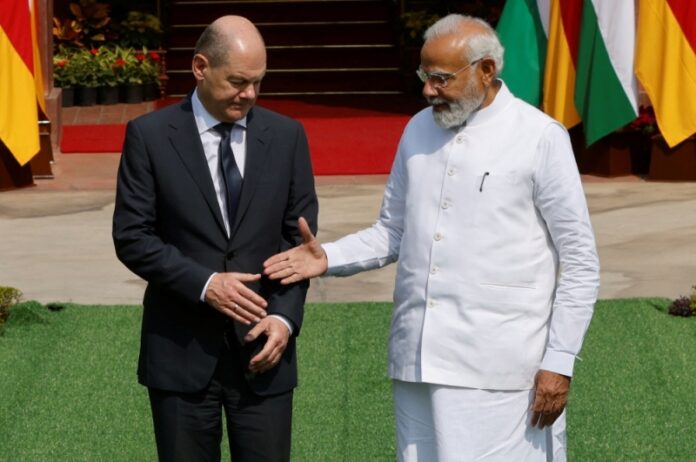NEW DELHI/BERLIN (AFP) – German Chancellor Olaf Scholz said on Thursday that he and Indian Prime Minister Narendra Modi were determined to sign a free trade deal between India and the European Union.
“This is an important issue and I will be personally involved,” Scholz said after a meeting with Prime Minister Modi in New Delhi.
The EU and India resumed negotiations on a free trade agreement last year, with the goal of completing negotiations by the end of 2023.
For the EU, a free trade deal with India would fit into the EU’s strategy of increasing engagement in the Indo-Pacific region, where the bloc seeks bilateral agreements to benefit from higher economic growth expected. The deal could also act as a counterbalance to China’s growing influence in the region. Scholz met with Modi the day after the one-year anniversary of Russia’s invasion of Ukraine. His visit, along with a large business delegation, underscored Delhi’s growing importance to Western countries seeking assistance to oppose the war in Moscow.
“The world is suffering from this invasion…but we will do everything to keep the world in a good place,” he said, adding that cooperation between India and Germany was “very important.”
Modi has tried to keep his ongoing G20 meeting away from discussing the war in Ukraine. His government has not openly criticized Moscow for the aggression, instead calling for dialogue and diplomacy to end the war.
India also significantly increased its oil purchases from Russia, its largest supplier of defense equipment, but prices fell.
Modi said India and Germany were determined to realize untapped potential in areas such as security and defense cooperation.
Scholz will also push hard on his $5.2 billion deal to sell six conventional submarines to India, but this latest attempt by the Western military manufacturing powerhouse will make New Delhi a military force to Russia. It tries to wean itself off the hardware dependency, but it’s unlikely to lead to immediate results.
Germany’s close economic ties with China, its main purchaser of machine tools, and Russia, its main energy supplier, have contributed to Germany’s prosperity over the past 15 years. Collaboration is especially strong.
While one of the stated goals of the lightning trip is to improve economic ties, officials are mindful of the need to press what will soon be the world’s most populous country into opposing Russia’s invasion, even if a severing of India’s economic ties with Moscow is not on the table.
“I’m convinced that our countries are closely linked, that we have common views, especially when it has to do with democracy,” said Scholz.
Many in the Global South see Western complaints about the invasion as hypocrisy, given their long history of military interventions around the world, and fear disrupted supply chains and inflation will cause hunger and famine.
Scholz last met Modi at a June summit of the Group of Seven industrial powers, to which he invited the Indian leader as part of outreach efforts that have become more urgent as concerns grow that China may step up its political support for Russia.
While China is one of Germany’s most important trading partners, the invasion brought home to many in Germany’s business community the lack of diversification in the supply chains on which they rely, lending new urgency to efforts to boost exposure to a huge potential market. Scholz said the 1,800 German companies already should increase their investment in India.
Despite interest, regulations and trade barriers make India a difficult market for German companies to enter.
The two leaders also discussed climate change, with business delegation members signing an agreement in the wind.
Wednesday, April 24, 2024
More
© London Post, All Rights Reserved by Independent Media Group UK Limited.






